(全)高考英语-易混淆形近词单词辨析
英语形近词辨析

一、accept和except1. accept [əkˈsɛpt] vt. 接受,同意例句:I accept your invitation to the party.2. except [ɪkˈsɛpt] prep. 除了例句:Everyone attended the meeting except for John.二、affect和effect1. affect [əˈfɛkt] vt. 影响,感染例句:His illness affected his ability to work.2. effect [ɪˈfɛkt] n. 影响,效果例句:The new policy had a positive effect on the company.三、advise和advice1. advise [ədˈvaɪz] vt. 劝告,建议例句:I advise you to study hard for the exam.2. advice [ədˈvaɪs] n. 忠告,建议例句:She gave me great advice on how to improve my writing skills.四、complement和compliment1. complement [ˈkɒmplɪmənt] n. 补充物,互补部分 vt. 补充,补足例句:The red wine complements the steak perfectly.2. compliment [ˈkɒmplɪmənt] n. 赞美,恭维例句:He received many compliments for his excellent performance.五、loose和lose1. loose [luːs] adj. 松的,宽松的例句:Her hair was tied up in a loose ponytail.2. lose [luːz] vt. 失去例句:Don't lose your keys again.六、stationary和stationery1. stationary [ˈsteɪʃənəri] adj. 静止的,不动的例句:The car remained stationary at the traffic light.2. stationery [ˈsteɪʃənri] n. 文具,信纸例句:I bought a set of beautiful stationery for writing letters.七、their、there和they're1. their [ðɛr] pron. 他们的例句:Their house is located near the park.2. there [ðɛr] adv. 在那里例句:He is waiting for you over there.3. they're [ðɛər] 缩写形式,代表"they are"例句:They're going to the beach for vacation.以上是关于一些常见英语形近词的辨析。
高中英语形似易混淆词汇
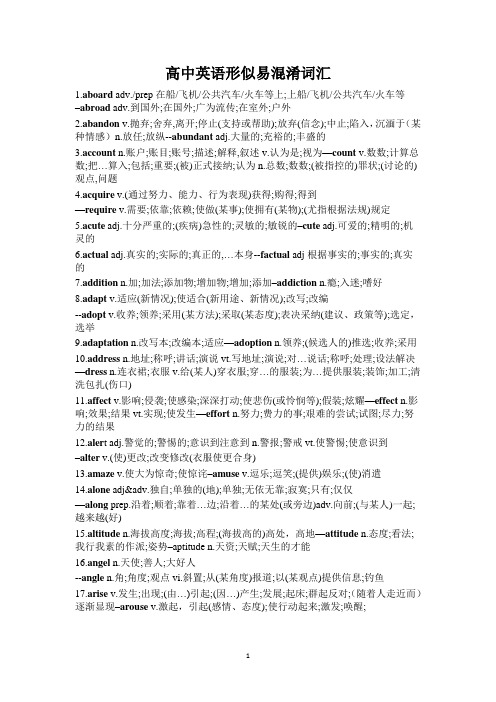
高中英语形似易混淆词汇1.aboard adv./prep在船/飞机/公共汽车/火车等上;上船/飞机/公共汽车/火车等–abroad adv.到国外;在国外;广为流传;在室外;户外2.abandon v.抛弃;舍弃,离开;停止(支持或帮助);放弃(信念);中止;陷入,沉湎于(某种情感)n.放任;放纵--abundant adj.大量的;充裕的;丰盛的3.account n.账户;账目;账号;描述;解释,叙述v.认为是;视为—count v.数数;计算总数;把…算入;包括;重要;(被)正式接纳;认为n.总数;数数;(被指控的)罪状;(讨论的)观点,问题4.acquire v.(通过努力、能力、行为表现)获得;购得;得到—require v.需要;依靠;依赖;使做(某事);使拥有(某物);(尤指根据法规)规定5.acute adj.十分严重的;(疾病)急性的;灵敏的;敏锐的–cute adj.可爱的;精明的;机灵的6.actual adj.真实的;实际的;真正的,…本身--factual adj根据事实的;事实的;真实的7.addition n.加;加法;添加物;增加物;增加;添加–addiction n.瘾;入迷;嗜好8.adapt v.适应(新情况);使适合(新用途、新情况);改写;改编--adopt v.收养;领养;采用(某方法);采取(某态度);表决采纳(建议、政策等);选定,选举9.adaptation n.改写本;改编本;适应—adoption n.领养;(候选人的)推选;收养;采用10.address n.地址;称呼;讲话;演说vt.写地址;演说;对…说话;称呼;处理;设法解决—dress n.连衣裙;衣服v.给(某人)穿衣服;穿…的服装;为…提供服装;装饰;加工;清洗包扎(伤口)11.affect v.影响;侵袭;使感染;深深打动;使悲伤(或怜悯等);假装;炫耀—effect n.影响;效果;结果vt.实现;使发生—effort n.努力;费力的事;艰难的尝试;试图;尽力;努力的结果12.aler t adj.警觉的;警惕的;意识到注意到n.警报;警戒vt.使警惕;使意识到–alter v.(使)更改;改变修改(衣服使更合身)13.amaze v.使大为惊奇;使惊诧–amuse v.逗乐;逗笑;(提供)娱乐;(使)消遣14.alone adj&adv.独自;单独的(地);单独;无依无靠;寂寞;只有;仅仅—along prep.沿着;顺着;靠着…边;沿着…的某处(或旁边)adv.向前;(与某人)一起;越来越(好)15.altitude n.海拔高度;海拔;高程;(海拔高的)高处,高地—attitude n.态度;看法;我行我素的作派;姿势–aptitude n.天资;天赋;天生的才能16.angel n.天使;善人;大好人--angle n.角;角度;观点vi.斜置;从(某角度)报道;以(某观点)提供信息;钓鱼17.arise v.发生;出现;(由…)引起;(因…)产生;发展;起床;群起反对;(随着人走近而)逐渐显现–arouse v.激起,引起(感情、态度);使行动起来;激发;唤醒;18.aspiration n.渴望;抱负;志向;送气;发送气音—inspiration n.灵感;启发灵感的人(或事物);使人产生动机的人(或事物);鼓舞人心的人(或事物);(突然想到的)好主意,妙计19.attract v.吸引;使喜爱;引起…的好感(或爱慕);招引;引起(反应)--attack n.袭击;进攻;抨击;抑制;侵袭;(情感的)一阵突发;(病、虫等的)损害v.袭击;攻击;进攻;抨击;非难;侵袭;奋力处理;20.back n.背部;腰背;脊柱;脊梁骨;后部;末尾;背面;最后几页,末尾;靠背;…靠背的;adj.背后的;后面的;过去的;舌后的adv.向后;在后;与(某物)有距离;控制住;忍住;以前;在曾去过的地方;回报v.(使)后退;帮助;支持;在…背后加固;给…加背衬;位于…的后面--lack n.缺乏;匮乏;短缺v.没有;缺乏;不足;短缺--pack v.收拾(行李);装(箱);把…裹(包)起来;(用某物)保存;堆积,压实;佩带,携带(枪支)n.包,包裹,捆;背包;一群;一帮;一伙(尤含贬义)--track n.轨道;小道;足迹,踪迹;车辙;站台;跑道;路径;方向;一首乐曲;一首歌曲v.追踪;跟踪;跟踪摄影;留下(脏)足迹21.bacon n.培根;熏猪肉;咸猪肉--beacon n.灯标;立标;无线电信标台;指路明灯22.bake v.(在烤炉里)烘烤;焙;(将某物)烤硬;(变得)灼热–cake n.糕饼;蛋糕;饼v.(用厚厚一层干后即变硬的软东西)覆盖;(干后)结成硬块;胶凝--fake n.假货;赝品;冒充者adj.伪造的;假的;冒充的vt.伪造;冒充;假装,装出(某种感情,有病等)–lake n.湖;湖泊--make v.制造;组装;拟订,制订;组成,构成;整理,铺床;造成(破坏、破损等);(使)产生;使成为;促使;作出(决定,估计等);迫使,强迫;表现;任命;选举;合计;赚钱;(尽力)赶往;使成功n.(机器、设备等的)品牌,型号--quake vi.颤抖;哆嗦;震动n.地震--sake利益;好处;缘由;n.(日本)清酒–take v.拿;携带;取走;运走;引领;使达到;把…推向;取材于;夺取;吃;减去;记录;拍照;量取;以…为例;接受;遭受;采取(措施);需要…时间;容纳;乘坐;误认为n.(不停机一次连续拍摄的)场景;镜头;收入额;进项;看法;意见–wake v.醒;醒来;唤醒;弄醒;唤起(记忆);使再次感觉到23.ban n.禁令v.取缔;明令禁止;禁止(某人)做某事(或去某处等)--bun圆面包;小圆甜蛋糕;圆发髻24.band n.流行音乐乐队;乐队;一伙人;一帮人;带;条纹;波段;范围vt.加彩条(或嵌条等);划分档次;分等级–brand n.品牌;类型v.丑化(某人);败坏(某人)名声bark n.树皮;(狗等的)吠声,嗥叫声;枪声;短促响亮的人声v.(狗)吠叫;厉声发令;厉声质问;擦破(或蹭掉)…的皮—dark adj.黑暗的;阴暗的;深色的;褐色的;有深色头发(或眼睛等)的;神秘的;邪恶的;忧郁的n.黑暗;暗处;暗色;阴影—park n.公园;园区;庄园;运动场;足球场v.停(车);泊(车);坐下(或站着);把…搁置,推迟(在以后的会议上讨论或处理)25.base n.底座;基底;根基;根据;出发点;来源;总部;基地vt.以…为据点(或总部等);把(总部等)设在adj.卑鄙的;不道德的–basis n.原因;基准;方式;基础;要素—bias n.偏见;偏心;偏爱vt.使有偏见;使偏心;使偏向–basin n.盆;一盆(的量);流域;盆地;凹地;港池26.beak n.鸟喙;鹰钩鼻;尖鼻;掌权者;(尤指)法官—peak n.高峰;顶峰;山峰;尖端;尖头;帽舌adj.最高度的;高峰时期的;巅峰状态的vt.达到高峰;达到最高值27.beam n.(建筑物的)梁;光线;波束;(粒子的)束;平衡木;笑容;眉开眼笑v.笑容满面;眉开眼笑;发射(电波);播送;照射--team n.团队;队;组,班vt.使互相配合;使协作;使合作28.beast n.野兽;兽;性情凶残的人;行为粗暴的人;讨厌的人(或事物)—breast n.乳房;胸部;胸脯;胸脯肉;胸脯(或乳房)…的;心窝;情感vt.登上…的顶部;挺胸从…中挤过29.battery n.电池;一系列;一群;殴打罪–battle n.战斗;战役;斗争;较量;争论;奋斗v.斗争;搏斗;奋斗--cattle n牛--bottle n.瓶子;一瓶(的量);奶瓶;勇气vt.把…装入瓶中--bottom n.底部;底面;…尽头;最末位置;屁股;有…底的adj.底部的;最后的;尽头的30.bent v.(bend的过去式&过去分词)(使)弯曲;(使)倾斜,偏向;把…弄弯;(使)拐弯n.天赋,爱好adj.弯曲的;驼背的;不诚实的;不正派的—rent n.租金;裂缝v租用,租借;出租;租金为—tent n.帐篷;帐棚31.beside prep.在旁边(或附近);与…相比--besides adv.再说;况且;此外;以及;也prep.除…之外(还)32.beard n.胡须;络腮胡子;须–bread n.面包;钱33.beef n.牛肉;牢骚;怨言v.老是抱怨,大发牢骚—reef n.暗礁;礁34.bil l n.账单;钞票;议案,法案;节目单;海报;鸟嘴;有…形喙的v.给(某人)开账单;把…宣传为…—pill n.药丸;药片;讨厌的人v.起球;结绒--spill n.洒出(量);溢出(量);泄漏(量);长梗火柴;(尤指从自行车/船上)摔下;跌落v.(使)溢出;洒出;泼出;涌出;蜂拥而出35.block n.大块;立方体;大楼;一栋楼房;(一段)街区;一大片土地;一批/组;障碍物;阻挡v.阻碍;堵塞;堵住(某人的路等);挡住;妨碍-–flock n.一大群;群;信众v.群集;聚集;蜂拥36.bloom n.花;健康有精神的面貌v.开花;变得健康/快活/自信—boom n.激增;繁荣;突然风靡的时期;深沉的响声v.轰鸣;以低沉有力的声音说;迅速发展;激增—doom n.死亡;厄运;毁灭v.使…注定失败/遭殃/死亡—gloom n.忧郁;愁闷;幽暗;黑暗–room n.房间;住所;空间;余地;可能性;有…室的v.租房;合租37.bomb n.炸弹;核弹;彻底的失败;很多钱v.轰炸;疾行;(考试)惨败;票房极差—comb n.梳子;梳理(头发);鸡冠v.梳理;仔细搜索—tomb n.坟墓38.bride n.新娘–bridge n.桥;纽带;船桥;鼻梁(架);假牙v.在…上架桥39.bother v.花费精力做…;使烦恼;打扰n.麻烦;令人烦恼的事物/人--brother n.兄;弟bond n.纽带;联系;关系;枷锁;桎梏;债券;保释金;按揭贷款v.使牢固结合;增强信任关系--pond n.池塘(尤指人工的)40.broad adj.宽阔的;…宽;广泛的;概括的;不具体的;辽阔的;乡音浓的;明显的--board n.木板;…用板材;董事会;膳食(费用);入学考试v.上船/火车/飞机/汽车;让乘客登机/上船;寄宿41.bound adj.一定会;有义务做…;准备前往…v.跳跃着跑;形成…的边界n.蹦跳;跳跃--bounce v.(使)弹起;反射;蹦;(使)上下晃动;颠簸行进;活泼兴奋地走;n.弹跳;弹性;活力;蓬松42.low adj.矮的;低于平均的;减少的;低声的;低于标准的;次要的;沮丧的;差的;不诚实的;暗淡的adv.低;低于期望水平;低声地n.低水平;低谷--bow v.鞠躬;低头;(使)弯曲n.弓;蝴蝶结;琴弓–bow l n.碗;钵;一碗;露天圆形剧场v.滚球;(向…)迅速移动;快速行驶--below prep.在(/到)…下面;(数量)少于;(级别/重要性)低于adv.在(/到)下面;零度以下43.but conj.而;相反;然而;除…之外prep.除…之外;除了adv.只有;仅仅n.借口;推辞–tub n.盆;食品盒--hut简陋的小房子;棚子44.case n.案例;实例;具体情况;事例;事实;特殊情况;调查的案件;待裁决的案件;诉讼;论据,辩词;病例;病人,伤员;境况;方面;箱,盒–cease v.(使)终止;结束45.huge adj.巨大的;极多的;程度高的;非常成功的;走红的--hug v.拥抱;搂抱;抱紧;缠紧,缚紧n.拥抱;搂抱46.calm adj.镇静的;沉着的;风平浪静的;无风的v.使平静;使镇静n.平静的时期;宁静的状态;泰然自若--clam n.蛤蜊;蚌v.(尤指被询问时)拒不开口;闭嘴不言47.capability n.能力;才能;军事力量;军事武器–capacity n.容量;容积;容纳能力;领悟(或理解、办事)能力;职位;职责;生产量,生产能力;功率48.cast v.向…投以(视线、笑容等);投射(光、影子等);使人怀疑;造谣中伤;投(钓线);扔;分配角色;把某人描写成;铸造;投票n.全体演员;铸件;铸造品;铸模;特性;投;掷--cost n.费用;花费;成本;(为做某事涉及的)努力,代价,损失v.需付费;价钱为;使丧失;使损失;使付出努力;使做不愉快的事;估算成本(costed--costed)49.chef n.厨师;主厨,厨师长--chief n.最高领导人;首领;酋长;族长adj.主要的;最重要的;首要的;最高级别的;为首的;(用于职位头衔)首席的;总的50.channel n.电视台;频道;波段;途径;渠道;系统;(表达的)方式,手段;水渠;水道;海峡v.为…引资;引导;贯注;(利用某途径)输送资金,提供帮助;(经过通道)输送,传送--canal n.运河;灌溉渠;导管;食道;气管--tunnel n.地道;隧道;(动物的)洞穴通道v.开凿隧道;挖地道--camel n.骆驼51.choir n.唱诗班;合唱团,歌唱队–chorus n.副歌;合唱曲;合唱团;歌舞队;齐声,异口同声v.合唱;齐声说;异口同声地说--chore n.家务活;日常事务;例行工作;令人厌烦的任务;乏味无聊的工作--coral n.珊瑚;珊瑚虫adj.珊瑚色的;红色的;粉红的52.client n.当事人;委托人;(连接在服务器上的)客户机--silent adj.沉默的;不爱说话的;少言寡语的;无声的;安静的;不喧闹的;不用言语表达的;拒绝讲的;不发音的53.clip n.回形针;夹子;首饰别针;修剪;电影片段;(用手)猛击,抽打v.别住;夹住;被夹住;修剪;碰撞(某物的边缘或侧面)–flip v.(使)快速翻转;迅速翻动;浏览;异常激动;神志不清;轻抛,轻掷;按(开关)n.轻抛,轻掷;空翻;浏览,草草翻阅adj.无礼的,轻率的--grip n.紧握;紧抓;(对…的)控制,影响力;理解;了解v.紧握;使感兴趣;使激动;吸引住(某人)的注意;对…产生强有力的影响;抓牢–slip v.滑倒;滑跤;滑离;脱落;悄悄疾行;溜;迅速放置;下降;陷入,进入;(迅速且容易地)穿上,脱下;摆脱n.差错;疏漏;纰漏;纸条;便条;小纸片;滑跤;滑倒--tip n.提示;尖端;小费;指点;垃圾场v.(使)倾斜;翻覆;倒出;倾倒;轻触;轻碰;(在户外)倒垃圾;给小费54.clean adj.洁净的;爱干净的;爱整洁的;无有害物的;无污染的;空白的;文明的;无犯罪记录的;公平的v.打扫;除去…的灰尘;使…干净;变干净adv.(行动)彻底地,完全地n.打扫;清扫--clear adj.明确的;明显的;清晰易懂的;清楚的;无疑的;思维敏锐而有逻辑的;容易看见的;无云/雾的;无斑/疤痕的;畅通无阻的;无罪的v.清理;清除(不需要的东西);使人离开;恢复畅通;不再受阻;变明朗;变透明;(烟、雾等)消散;(使)变清醒;变平静;证明无罪/无辜adv.离开;不靠近;不接触;一直(到远处)–clench v.捏紧,攥紧(拳头等),咬紧(牙齿等);握紧;抓牢;攥住55.clue n.迹象;线索;提示;解答提示v.为…提供最新信息—cue n.暗示;提示;信号;(戏剧的)提示,尾白v.给(某人)暗示(或提示)—cure v.治愈;治好;解决(问题);矫正,改正n.药;药物;治疗;疗法;疗程;措施;对策56.circuit n.环行;环行路线;电路;线路;巡回赛;赛车道;巡回–circus n.马戏团;马戏表演;引人注意的人/事;热闹场面;环形交叉路口--circular adj.圆形的;环形的;环行的;绕圈的;循环论证的;大量送发的--circle n.圆圈;圆;圆形;环;圆周;圆形物;环状物;弧形楼座;圈子,阶层,界v.盘旋;环行;转圈;围绕…画圈;圈出57.cite v.提及(原因);列举;引用;引述;传唤;传讯;嘉奖--site n.地点;建筑工地;现场;场所;网站v.使坐落在;为…选址--sight n.看见;视力;视觉;视野;景象;名胜v.看到,发现(期待的事物)pete v.竞争;对抗;参加比赛(或竞赛)--complete v.完成;结束;填写(表格);使完整;使完美adj.彻底的;全部的;完整的;整个的;包括;完成petition n.竞争;比赛;竞赛;竞争者;对手--completion n.完成;结束--compensation n.补偿物;赔偿金;补偿金;使坏的情况变好的事物;(对不利局面的)补偿plement v.补足;补充;使完美;使更具吸引力n.补充物;补足物;补足语–compliment n.称赞;赞扬;致意;祝贺n.赞美;称赞;钦佩--implement v.使生效;贯彻;执行;实施n.工具;器具;(常指)简单的户外用具petent adj.有能力的;称职的;足以胜任的;尚好的;有决定权的;–component n.组成部分;成分;部件–opponent n.对手;竞争者;反对者prise v.包含;包括;组成;构成;由…组成;是(某事物的)组成部分--compromise n.妥协;折中;互让;和解;折中方案;达成和解v.妥协,折中,让步63.contribute v.捐献;捐赠;捐助;是…的原因之一;增加;增进;添加(到某物);撰稿--distribute v.分配;分发;分销;分散;使散开;使分布--attribute v.把…归因于;认为…是由于;认为是…所为(或说、写、作)n.属性;特征;性质;定语64.conversation n.会话;交谈--conservation n.保护;文物保护;防止流失(或浪费、损害、毁坏);保持--contradiction n.矛盾;不一致;对立;反驳65.conscience n.良心;良知;内疚;愧疚;凭良心--conscious adj.意识到;注意到;有知觉的;有意识的;慎重的;刻意的;特别感兴趣的66.controversial adj.引起争论的;有争议的–conservative adj.保守的;守旧的;低于实际数量的n.保守党支持者;保守者;因循守旧者--contradictory adj.(相互)矛盾的;对立的;不一致的67.context n.上下文;语境;(事情发生的)背景,来龙去脉--contest n.竞赛;比赛;(控制权或权力的)争夺,竞争v.争取赢得…;争辩;就…提出异议--content n.所容纳之物;内容;目录;主题;含量adj.满意;满足;愿意v.满足;满意;知足;使满意;使满足68.contrast n.明显的差异;对比;明显不同的人(或事物);颜色反差,明暗对比v.对比;对照;形成对比–contact n.联系;接触;遇见(某人);碰上(要处理的事);会见;熟人;社会关系;接通v.接触;取得联系adj.供联系的;有关系的;由接触引起的--contract n.合同;契约;协议v.(使)收缩;感染(疾病);与…订立合同(或契约);订立…的合同(或契约)69.consume v.消耗;耗费;吃;喝;饮;使充满(强烈的感情);烧毁–costume n.服装;装束;戏装–custom n.风俗;习俗;(个人的)习惯,习性,惯常行为;(顾客对商店的)惠顾,光顾adj.定做(制)的--customs n.(港口或机场的)海关;关税;进口税70.cook v.烹调;烹饪;密谋;秘密策划n.厨师;炊事员--cooker n.炊具;炉具71.crash n.碰撞;撞车;碰撞声,碎裂声;暴跌;破产;失败;崩溃v.碰撞;撞击;(使)猛撞;使发出巨响;(突然)贬值,倒闭,失败;崩溃;惨败;入睡;心脏停止跳动adj.应急的;速成的--crush v.压坏;压伤;挤压变形;把…挤入,将…塞进;压碎;捣碎;(使)起皱;镇压;破坏(某人的信心/幸福)n.拥挤的人群;果汁饮料--cash n.现金;(任何形式的)金钱,资金v.兑现支票72.cube n.立方体/形;立方形的东西(尤指食物);三次幂v.求…的立方;把…切成小方块--tube n.管子;管状物;一罐啤酒;管状器官;电视v.给…装上管子;插管;用管道运输73.damp adj.潮湿的;湿气重的n.潮湿;潮气;湿气;湿块v.弄潮;使潮湿;抑制(感情等)dump v.倾倒;抛弃;丢弃;扔掉;推卸;(向国外)倾销;抛售;随便堆放n.垃圾场;废物堆;脏地方;令人讨厌的地方74.deer n.鹿--dear adj.亲爱的;昂贵;宝贵的;珍视的n.仁慈的人;可爱的人;亲爱的;乖乖adv.高价地;昂贵地75.delicate adj.清淡可口的;纤细的;精美的;微妙的;脆弱的,易碎的;精密的;纤弱的--dedicate v.把…奉献给;题献词;为…举行奉献典礼;为…举行落成典礼;76.departure n.离开;起程;(在特定时间)离开的飞机(或火车等);违反;背离;逾越--department n.部门;部;系;处;司;局;(医院的)科77.desk n.书桌;写字台;办公桌;问讯台,服务台;(报社、电视台等的)办公处,部,室,组–disk n.磁盘;磁碟–risk n.危险;风险;危险人物;会带来风险的事物v.使…冒风险(或面临危险);冒…的风险(或危险);冒险做;(明知结果而)大胆做78.dessert n.甜点;(饭后)甜食--desert n.沙漠;荒原v.抛弃,遗弃;舍弃;擅离(部队);逃走;开小差;背离;使失望79.dad n.爸爸;爹爹--bad adj.令人不快的;问题成堆的;坏的;质量差的;拙于;不擅;严重的;不适合的;不道德的;顽皮的;有害;有病的;变质的;发脾气;觉得不舒服n.坏人;坏事(物)adv.很;非常--bed n.(河)床;(海等的)底;花坛;苗圃;菜园;底层v.把…固定在80.diary n.记事簿;日记簿–dairy adj.乳品的;牛奶的;奶制的;乳品业的n.牛奶场;乳品场;乳品公司/店--daily adj.每日的;日常的;按日的adv.每日;每天n.日报81.dive v.潜水;跳水;俯冲;突然下降;扑,冲;假摔n.跳水;潜水;俯冲;扑;冲;假摔--drive v.驾驶;驾车送(人);拥有(或驾驶)…汽车;驱动;迫使;驱赶;激励;击n.驱车旅行;驾车路程;传动(或驱动)装置;车道;有组织的努力,运动;强烈欲望;冲劲;猛击;驱动器;驱赶;(用于路名)大道82.drag v.拖,拽;缓慢而费劲地移动;过得很慢;用鼠标拖动;(使)在地上拖着移动n.累赘;拖累;令人厌烦的人–bag n.纸袋;塑料袋;手提包;旅行袋;一袋(的量);大量;眼袋;猎获物v.把…装进袋子;猎杀(动物);批评--tag n.标签;标牌;诨名;标记;符号;名字v.给…加上标签;把…称作;给…起诨名;加标识符(或标记、标签)于83.drug n.毒品;药;药物v.使服麻醉药;使服兴奋剂–dug v.(dig的过去式&过去分词)掘(地);凿(洞);挖(土);掘得;搜寻(物品)--plug n.插头;(电源)插座;转换插头;塞子;栓塞;推销v.堵塞;封堵;补足;补充;供给;推广;宣传--bug n.故障;程序错误;缺陷;小昆虫;小病;热衷;着迷;窃听器v.在…装窃听器;窃听;使烦恼;使恼怒—tug v.拖;拽n.猛拉/拽;一股强烈的感情84.doll n.玩偶;玩具娃娃v.把…打扮漂亮–dull adj.迟钝的;枯燥无味的;令人生厌的;不明亮的;无光泽的;隐约的;低沉的;阴沉的;萧条的v.减轻;(使)变麻木;使迟钝;(使)变得无光泽,变模糊,变低沉--drill v.训练;操练;钻(孔);打(眼);培训;作…演习n.钻;钻头;钻机;钻床;训练;练习;演习;军事训练;程序85.dusk n.黄昏;傍晚--dust n.灰尘;粉尘;尘埃;粉末v.擦去…的灰尘;掸去86.enable v.使能够;使有机会;使成为可能;使实现–unable adj.无法;未能;没有所需技能(或力量、时间、知识等)--disable v.使丧失能力;使伤残;使无效;使不能运转87.enhance v.增强;提高;增进--hence adv.因此,所以88.envy n.羡慕;忌妒v.羡慕;忌妒;庆幸不必做别人非做不可的事--envoy n.特使;使者;使节--ivory n.象牙;(其他动物的)长牙;象牙制品;象牙色89.estate n.庄园;住宅区;工业区;个人财产;(尤指)遗产--estimate v.估计;估算;估价n.估计;估价--establish v.创立;设立;建立;确立;使立足;使稳固;查实--evaluate估计;评价;评估--evacuate v.疏散;撤离;转移;撤出;撤空;排空(胃肠)curricula r adj.课程的--curriculum n.全部课程—certificate n.证明书;结业证书v.发给结业证书90.except prep.除…之外conj.除了;只是v.不包括;不计;把…除外--expect v.预料;预计;期待;盼望;要求;指望;料想–expert n.专家;行家;能手adj.熟练的;内行的;专家的;经验(或知识)丰富的91.exception n.例外--expectation n.预料;预期;期待;盼望;期望;指望92.exploit v.开发;利用;剥削;压榨;运用n.英勇(或激动人心、引人注目)的行为–explore v.勘探;探索;考察;探究;探讨;探查;--explode v.爆炸;爆裂;勃然(大怒);突然发生(危险);迸发(感情);突然做起…来;突然发出巨响;突增;推翻93.facilitate v.促进;促使;使便利--facility n.设施;设备;特色;场所;天资;天赋94.fame n.名声;声誉;名气–frame n.框架;构架;骨架;眼镜框;体形;总的思想;帧;一幅画v.给…做框;给…镶边;作伪证陷害;拟订;(以某种方式)表达adj.木结构的--flame n.火焰;鲜红色;橙黄色;强烈的感情;激情;火药味电邮v.燃烧;(因强烈情绪而)变红,使变红;向(某人)发送火药味电邮(或互联网信息)95.fantastic adj.极好的;了不起的;大得难以置信的;荒诞不经的;不切实际的--fascinating adj.极有吸引力的;迷人的96.father n.父亲;祖先;创始人;先驱;鼻祖;天父;神父v.做…的父亲;创立(新思想);发明(新方法)--farther adj.(空间、方向或时间上)更远的;adv.(时间或空间上)较远–further adj.进一步的;更多的adv.(空间距离)较远;(过去或未来)更久远;在更大程度上;在更大范围内;此外v.促进;增进--feather n.羽毛;翎毛97.female adj.女性的;雌的;女性特有的;能结果实的n.雌性动物;雌株;女子–formal;适合正式场合的;正规的;正式的;庄重的;合乎规矩的;方式上的98.fiber(fibre)n.纤维;纤维质;纤维制品--fabric n.织物;布料99.fiction n.小说;虚构的事;假想之物--friction n.摩擦;摩擦力;争执;分歧;100.file n.文件;档案;文件夹;卷宗v.把(文件等)归档;提起(诉讼);提出(申请);送交(备案);--profile n.轮廓;面部的侧影;简介;概述;传略;印象;形象v.扼要介绍;写简介101.fist n.拳;拳头--first adv.第一;最初;第一次;(列举时用)首先n.第一个人(或事物);前所未有的事情;一挡,最低挡;(英国大学学位)最高成绩;一等品102.flash v.(使)闪耀;闪光;(向…)用光发出(信号);(快速地)显示;飞速运动;突然想到;(使)闪现;快速发送(信息);突然显露(强烈情感)n.闪光;闪耀;(信号灯)闪亮;(想法的)突现;(情感的)突发;闪光灯;彩条;动画制作程序adj.庞大的;昂贵的;穿着奢华的--flush v.脸红;发红;冲(抽水马桶);(用水)冲洗;(用水)冲走n.潮红;脸红;一阵强烈情感;(流露出的)一阵激情;冲(抽水马桶)--flesh n.肉;(人体的)皮肤;果肉;肉体v.充实(计划,论据等的内容)–fresh adj.新鲜的;新近出现的;新近体验的;不同的;清新的;淡的;清凉的;凉飕飕的;精力充沛;刚从…来103.flit v.掠过;迁移;搬家n.夜逃–spit v.吐;唾(唾沫、食物等);啐唾沫;怒斥;下小雨n.吐痰;唾沫;啐唾沫;吐食物;岬;沙嘴–spilt(spill的过去式/过去分词)v.(使)洒出;溢出;涌出;蜂拥而出--split v.(使)分裂;使分开;分摊;分享;(使)撕裂;划破;分手;(迅速)离开n.分裂;分离;分歧;划分;分别;份额;裂缝;裂口–spoil v.破坏;糟蹋;毁掉;溺爱;宠坏;善待;格外关照;变坏n.赃物;掠夺物;成功所带来的好处;权力地位的连带利益104.feet(foot的复数)n.脚;英尺;基础;袜底,有…只脚(的);…英尺高/长…--fleet n.舰队;捕鱼船队;海军;机群,车队adj.跑得快的;快速的105.flight n.航班;班机;飞行;飞翔;空中航行;航程;飞行方向;一段楼梯;逃避;异想天开;(一起飞行的)鸟群/机群v.(熟练地踢、击或掷)使(球)在空中飞行–fright n.惊吓;恐怖;使人惊吓的经历;恐怖的经历–fight v.打仗;搏斗;打架;参加(竞赛);竞争;极力反对;努力争取;争辩;(为…)和某人打官司n.搏斗;打架;斗争;(尤指体育运动)比赛;争论;战斗;斗志106.flow n.流;流动;持续生产;不断供应;滔滔不绝;连贯;涨潮v.流;流动;涌流;流畅大量供应;被强烈感到;飘垂;涨潮–flew v.(fly的过去式)飞;飞翔;飞行;航行;飞越;空运;疾行;猛然移动;飞逝;飘扬;四处传播;逃跑107.fellow n.同事;同辈;同类;家伙;小伙子;董事;会员;(接受奖学金的)研究生adj.同类的;同事的;同伴的;同情况的–follow v.跟随;跟着;(指时间或顺序)在…后发生;在…后做;是…的必然结果;接着是;沿着(道路、小径等);沿着…延伸;接受,听从(忠告、指示等);追随;理解;密切注视;对…产生浓厚兴趣而关注;涉及…生活;按…方式/方向发展--hollow adj.中空的;空心的;凹陷的;沉闷回荡的;空响的;无诚意的;无真正价值的n.凹陷处;坑洼处;洞;孔v.挖---shallow adj.浅的;肤浅的;浅薄的;(呼吸)浅的v.(使)变浅;(使)变浅薄108.flu n.流行性感冒;流感–fuel n.燃料;(尤指使争论等继续或更加激烈的)刺激性言行v.给…提供燃料;给(交通工具)加油;增加;加强;刺激109.fluid n.液体;流体;液adj.流畅优美的;易变的;不稳定的;流动的;流体的–liquid n.液体adj.液体的;液态的;易变为现金的;清澈的;明亮的;晶莹的;清脆的110.fond adj.喜欢的;喜爱;深情的–found v.创办,成立;建造;以…为基础;(find)的过去式&过去分词)–fund n.基金;专款;资金;现款;(相当)数量;储备v.为…提供资金;拨款给111.from prep.始于;从…开始;得自;源于;由…(制成);从;从…(到)–form n.表格;种类;形状;体形;形式;结构;良好的健康状态;良好表现;体能;惯常做法;习俗;礼貌v.(使)出现;(使)形成;(使)组成;排列;建立;有…功能–inform v.知会,通知;通告;(使)了解,(使)熟悉112.genius n.天才,天资,天赋;天才人物;(特别的)才能,本领--genuine adj.真的;名副其实的;真诚的;诚实的;可信赖的113.envelop v.包住;裹住;盖住–envelope n.信封;塑料封套;塑料封皮114.forth adv.向前,向前方;外出,离去–fourth adj.第四的,第四个的;四分之一的n.第四,月的第四日;四分之一num.第四115.fog n.雾;迷惘;困惑v.(使)雾气笼罩;使迷惘;使混淆不清–frog n.蛙;青蛙116.height n.身高;高度;高;高地;最佳点;更好;极端–light n.光;光线;光亮;光源;电灯;火柴;眼神;浅色;窗adj.明亮的;有自然光的;浅色的;轻的;轻便的;分量不足的;轻柔的;容易做的;少量的;不严厉的;娱乐性的;不严肃;无忧无虑的;不腻的;酒精含量低的;睡得不沉的v.点燃;开始燃烧;燃起来;照亮;使明亮;用光指引adv.(旅行)轻装地–night n.夜;夜晚;(举行盛事的)夜晚,…之夜--tight adj.牢固的;紧的;难解开的;紧。
高考英语常见(形近)易混词汇合集
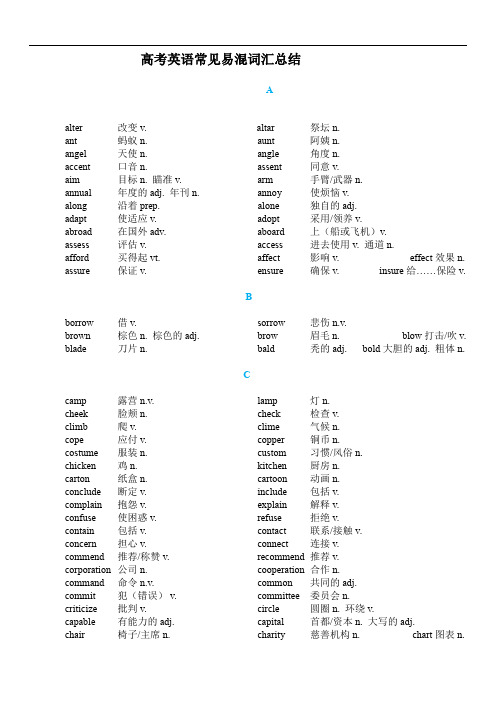
高考英语常见易混词汇总结Aalter改变v.altar祭坛n.ant蚂蚁n.aunt阿姨n.angel天使n.angle角度n.accent口音n.assent同意v.aim目标n. 瞄准v.arm手臂/武器n.annual年度的adj. 年刊n.annoy使烦恼v.along沿着prep.alone独自的adj.adapt使适应v.adopt采用/领养v.abroad在国外adv.aboard上(船或飞机)v.assess评估v.access进去使用v. 通道n.afford买得起vt. affect影响v.effect效果n. assure保证v.ensure确保v.insure给……保险v.Bborrow借v.sorrow悲伤n.v.brown棕色n. 棕色的adj.brow眉毛n.blow打击/吹v. blade刀片n.bald秃的adj.bold大胆的adj. 粗体n.Ccamp露营mp灯n.cheek脸颊n.check检查v.climb爬v.clime气候n.cope应付v.copper铜币n.costume服装n.custom习惯/风俗n.chicken鸡n.kitchen厨房n.carton纸盒n.cartoon动画n.conclude断定v.include包括v.complain抱怨v.explain解释v.confuse使困惑v.refuse拒绝v.contain包括v.contact联系/接触v.concern担心v.connect连接v.commend推荐/称赞v.recommend推荐v.corporation公司n.cooperation合作n.command命令mon共同的adj.commit犯(错误)mittee委员会n.criticize批判v.circle圆圈n. 环绕v.capable有能力的adj.capital首都/资本n. 大写的adj.chair椅子/主席n.charity慈善机构n.chart图表n.career (职业)生涯n.cancer癌症n.cancel删去v.content内容/目录n. 满意v.context上下文n.contest竞争v.contact接触/联系v.contract合同n.contrast对照v.champion冠军n.champagne香槟酒n.campaign战役n.comment评论mence开始merce商业n.constant不断的adj.contest比赛n.content内容,目录n. 满意v.crow乌鸦n.crown王冠n.clown小丑n.cow奶牛n.Ddrawn憔悴的adj.drown溺亡v.diary日记n.dairy牛奶场n.definite明确的adj.infinite无限的adj.digest摘要n.v. 消化v.digital数字的adj.despair绝望v.desperate绝望的adj.dessert甜点n.desert沙漠n. 背弃v.destruction破坏n.construction建筑物n.Eexplore探索v.explode爆炸v.exercise练习n.v.experiment 实验n.extensive广泛的adj.intensive密集的adj.extend延长v.expand扩大v.expend花费vt.expect期待v.except除……之外v.excel擅长v.accept接受v.Ffloor地板n.flour面粉n.factor因素n.factory工厂n.flash闪光v. 闪光灯n.fresh新鲜的adj.flesh肉n.full完全的/满的adj.fill装满v.fall落下v. 秋天n.form表格/结构n. 形成v.former以前的adj. 前者n.farm农场n.farmer农民n.Ggeneral一般的adj. 将军n.generate发生v.gentle绅士的adj.generous大方的adj.gold金n.goal目标/球门n. 进球得分v.Hhang悬挂v.hand手n.howl狼嗷v.growl咆哮v.hope希望n.v.hook钩子n. 勾住v.hoop铁环/篮筐n.Iidea想法n.ideal理想的adj.implicit含蓄的adj. explicit明确的adj.immoral不道德的adj.immortal不朽的adj.inspiration灵感n.aspiration渴望/志向n.immigrant(外来)移民n.emigrant移居国外的人n.insist坚持v.consist包括v.assist帮助v. invite邀请v.invest投资v.invent发明v. import进口v.important重要的adj.export出口n. impose改进v.JKknowledge知识n.acknowledge答谢/承认v.Llittle少量adj.adv.litter垃圾n.lease出租v. 租约n.least最少adj.adv.lab实验室n.cap出租车n.latitude纬度n.altitude海拔高度n.later后来tter后者n.letter信n. gratitude感谢/欣赏v.attitude态度n. constitute构成v.Mm edal奖牌n.model模型n.motto格言n.motor发动机n.metal金属n.mental精神的adj.match比赛/火柴n.march三月n. 行军v.meat肉n.mean意味着v. 吝啬的adj. 平均值n.Nnatural自然的adj. neutral中立的adj.Ooral口头的adj aural听觉的adj.Ppray祈祷v.prey猎物n.pretend假装v.intend计划v.phrase短语n.perhaps或许adv.protest抗议v.protect保护v.principal主要的adj. 校长n.principle原则n.practical实际的adj.particular特别的adj.pass过v.past过去的adj.path小路n.police警察n.policy政策n.politics政治n.pet宠物n.petrol汽油n.petroleum石油n.process进程n.加工处理v.proceed行进/继续做v. precede领先v.purpose目的n.suppose假设v.propose建议n. 提出v.peel果皮n. 剥落v. peer凝视v. peek偷看v. peep偷窥v.press压v. 出版社n.impress留下印象v.express表达v. 快递n.depress使沮丧v.price价格n.pride骄傲n.proud骄傲的adj.prize 奖n. 珍视v.Qquite相当adv.quiet安静的adj.Rreply回复v.rely依靠v.refer查阅,谈到v.infer推断v.rocket火箭n.racket球拍n.range范围n.arrange安排v.random随意的adj.wisdom智慧n.rent租用v. 租金n.lent借(出)v.rude粗鲁的adj.crude天然的adj. 石油n.require需要v.inquire询问v.acquire获得v.rare罕见的adj.rate比率n. rear后部的adj.reject拒绝v.inject注射v.deject使沮丧v.reap收割v. rip 撕裂v.ripe成熟的adj.respect尊敬v.aspect方面n.inspect检查v.suspect怀疑v.Sstress压力n. 强调v.street街n.steal偷v.steel钢n.suit套装n.suite套房n.scare惊吓v.scar伤疤n.staff员工n.stuff原料n.spring春天/泉水n.spirit精神n.seem好像adv.same相同adj.sample样品n.simple简单的adj.store楼层n.stair 楼梯n.steam团队n.stream溪流n. 流v.story故事n.store商店n. 贮存v.secure安全的adj. 保护v.sector部门/区域n.significant有意义的adj. magnificent壮丽的adj.sweet甜的adj. sweat 汗水n.swear发誓v. source来源n.resource资源n.sauce酱n. state国家/州/状况n. 陈述v.status状态/地位/身份n.statue塑像n. steel钢铁n.steer 控制v.steep陡峭的adj. several几个pron.serve服务v.deserve值得/活该v.service服务n. stick坚持/刺v.steak牛排n.strict严格的adj.strike罢工/敲v.Ttax税n.taxi出租车n.target目标n.tragedy悲剧n.text文本n.test测试n.tent帐篷n. trap陷阱n.tag标签n.trade贸易n.v. true真的adj.trust相信v.treat治疗/款待v. trick诡计n.truck货车n.track轨道n. 追踪v.UVvision视力/幻觉n.version版本n.Wwave挥手v. 波浪n.wavy波浪的adj.XYZ。
高考英语词汇常见形近单词(易混单词)
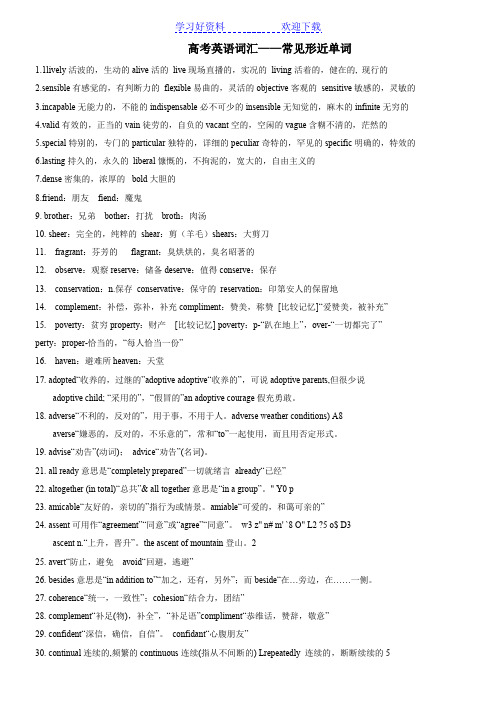
高考英语词汇——常见形近单词1.1lively活波的,生动的 alive活的live现场直播的,实况的living活着的,健在的, 现行的2.sensible有感觉的,有判断力的flexible 易曲的,灵活的objective 客观的sensitive敏感的,灵敏的3.incapable无能力的,不能的indispensable必不可少的insensible 无知觉的,麻木的infinite无穷的4.valid有效的,正当的vain 徒劳的,自负的vacant 空的,空闲的vague含糊不清的,茫然的5.special 特别的,专门的particular独特的,详细的peculiar 奇特的,罕见的specific明确的,特效的sting持久的,永久的liberal慷慨的,不拘泥的,宽大的,自由主义的7.dense 密集的,浓厚的bold大胆的8.friend:朋友fiend:魔鬼9. brother:兄弟bother:打扰broth:肉汤10. sheer:完全的,纯粹的shear:剪(羊毛)shears:大剪刀11. fragrant:芬芳的flagrant:臭烘烘的,臭名昭著的12. observe:观察reserve:储备deserve:值得conserve:保存13. conservation:n.保存conservative:保守的reservation:印第安人的保留地14. complement:补偿,弥补,补充compliment:赞美,称赞[比较记忆]“爱赞美,被补充”15. poverty:贫穷property:财产[比较记忆] poverty:p-“趴在地上”,over-“一切都完了”perty:proper-恰当的,“每人恰当一份”16. haven:避难所heaven:天堂17. adopted“收养的,过继的”adoptive adoptive“收养的”,可说adoptive parents,但很少说adoptive child; “采用的”,“假冒的”an adoptive courage假充勇敢。
高考英语近义动词名词形容词形近词辨析小结
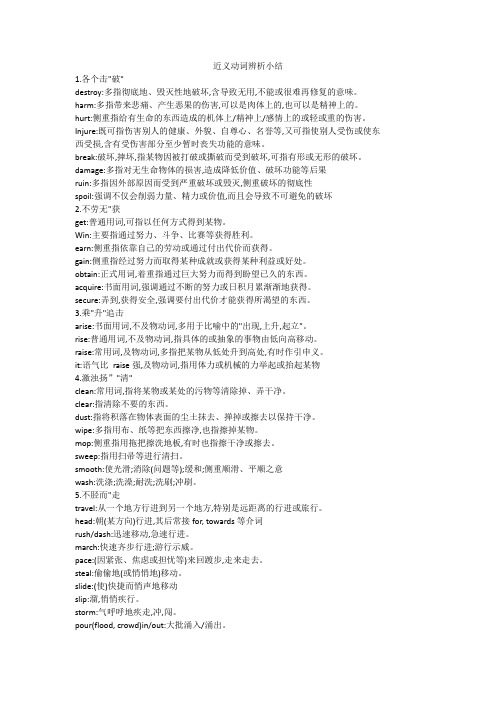
近义动词辨析小结1.各个击"破"destroy:多指彻底地、毁灭性地破坏,含导致无用,不能或很难再修复的意味。
harm:多指带来悲痛、产生恶果的伤害,可以是肉体上的,也可以是精神上的。
hurt:侧重指给有生命的东西造成的机体上/精神上/感情上的或轻或重的伤害。
Injure:既可指伤害别人的健康、外貌、自尊心、名誉等,又可指使别人受伤或使东西受损,含有受伤害部分至少暂时丧失功能的意味。
break:破坏,摔坏,指某物因被打破或撕破而受到破坏,可指有形或无形的破坏。
damage:多指对无生命物体的损害,造成降低价值、破坏功能等后果ruin:多指因外部原因而受到严重破坏或毁灭,侧重破坏的彻底性spoil:强调不仅会削弱力量、精力或价值,而且会导致不可避免的破坏2.不劳无"获get:普通用词,可指以任何方式得到某物。
Win:主要指通过努力、斗争、比赛等获得胜利。
earn:侧重指依靠自己的劳动或通过付出代价而获得。
gain:侧重指经过努力而取得某种成就或获得某种利益或好处。
obtain:正式用词,着重指通过巨大努力而得到盼望已久的东西。
acquire:书面用词,强调通过不断的努力或日积月累渐渐地获得。
secure:弄到,获得安全,强调要付出代价才能获得所渴望的东西。
3.乘"升"追击arise:书面用词,不及物动词,多用于比喻中的"出现,上升,起立"。
rise:普通用词,不及物动词,指具体的或抽象的事物由低向高移动。
raise:常用词,及物动词,多指把某物从低处升到高处,有时作引申义。
it:语气比raise强,及物动词,指用体力或机械的力举起或抬起某物4.激浊扬”"清"clean:常用词,指将某物或某处的污物等清除掉、弄干净。
clear:指清除不要的东西。
dust:指将积落在物体表面的尘土抹去、掸掉或擦去以保持干净。
wipe:多指用布、纸等把东西擦净,也指擦掉某物。
高考英语形近词辨析81组

高考前必须分清的英语单词1. angel n. 天使angle n. 角度2. adapt vt. 适应adopt vt.采用3. altitude n. 海拔;高度attitude n. 态度;看法4. affect v.影响;使感染effect n.结果;影响5. award (v.)授予,(n.)奖品reward n.& v.奖赏6. attach v.附属于,附加attack v.袭击,攻击attract v.吸引,招引7. assure v. 保证ensure v.确保insure v.给......保险8. broad adj.宽阔的abroad adv.国外9. board v.& n.上船,甲板,布告牌 aboard adv.上(船,飞机)10. bear n.& v.熊,忍受beard n. 胡须beer n. 啤酒11. certain adj.确信,相信curtain n.窗帘12. chicken n.鸡kitchen n.厨房13. clarify vt.阐明,澄清classify vt.分类,归类14. content n.&adj. 内容;满足的contain v. 包含15.include v. 包含,包括conclude v. 下结论16. context n.上下文contest n.竞争, 比赛17. costume n.服装custom n.习惯18. continent n.洲,大陆convenient adj.方便的19. collar n.领子color n.颜色20. desert n.沙漠;不毛之地dessert n.甜点21. dairy n.牛奶厂diary n.日记22. except v.& conj.除外expect vt. 期望,预计23. inspect vt.视察suspect vt.怀疑24. explode v.爆炸explore v.探险25. father n.父亲farther adj.更远的26. figure n.人物,书画finger n.手指27. flower n.花flour n.面粉28. fluently adv.流利地,流畅地frequently adv.经常的29. glass n.玻璃grass n. 草,草坪tely adv. 最近late adj. 迟到,晚了31. hardly adv.几乎不hard adj.硬的adv.努力地32. idea n.想法,念头,主意 ideal adj.理想的,完美的33. incident n.事件accident n.意外34. invention n.发明;创造invitation n.邀请35. intention n.意图,动机invention n.发明36.superior 高级的,优越的inferior 低级的,次的37. junior n.& adj.下级,低年级senior n.& adj.级别高的;高年级的38. language n.语言luggage n.行李39. later adj. & adv.后来latter adj. & adv.后者40. lone adj.孤独的alone adj.单独的lonely adj.寂寞的41. loose adj.松的lose v.丢失42. majority n.大多数,大部分minority n.少数,少数民族43. march n. & v.三月;前进match n. 比赛44. message n.音讯,口信passage n.通道;章节passenger n.乘客45. measure n.& v.量度,测量 treasure n.金银财宝46. medal n.勋章,奖牌model n.& adj.模型,模特47. metal n.金属mental adj.精神上的48. machine n.机器medicine n.药;医学49. pat v.轻拍tap v.轻敲;挖掘50. pattern n.格式,样式partner n.合作者,协作者51. personnel n.人事personal adj.个人的52. phrase n.短语,片语praise v.表扬53. police n.警察policy n.政策54. potato n.马铃薯tomato n.西红柿tobacco n.烟丝55. price n.价格prize n.& v.奖励,奖品56. pull v.拉,拖,扯push v.推,挤57. purpose n.目的suppose v.假设58. protest n.抗议protect vt.保护59. principal n.校长principle n.原则60. pass v.穿过,通过past adj.过去的;prep.在…..之后61. patent n.专利patient n. 病人;adj. 耐心的62. quality n.质量quantity n.数量63. queen n.女王queue n.& v.排队64. quite adv.相当quiet adv.安静地65. realize v.意识到,领悟recognize v.认出,认可66. require vt. 需要acquire vt. 获得67. secretary n.秘书secretly adv.秘密地68. serve vt. 服务,招待severe adj.严重的;激烈的69. site n. 场所sight n. 视力;视野;景象;见解70. socks n.短袜stockings n. 长筒袜71. statue n. 塑像status n. 地位72. steal vt. 偷steel n. 钢73. story 故事storey 楼层74. strike vt. 击打,袭击stick vi. 坚持,粘贴,n棍子strict adj.严格的75. sweet adj. 甜的sweat n. 汗水76. tax n.税taxi n. 出租77. thirsty adj.口渴的thirty n.三十78. through prep.通过thorough adj.彻底的though adv.尽管即使79. urgent adj.紧急的agent n.代理人80. unit n.小组,分队,单位unite v.团结,联合(unification)81. widow n. 寡妇window n.窗户。
高中英语必须学会区分的常考形近词!一定要收藏!(二)
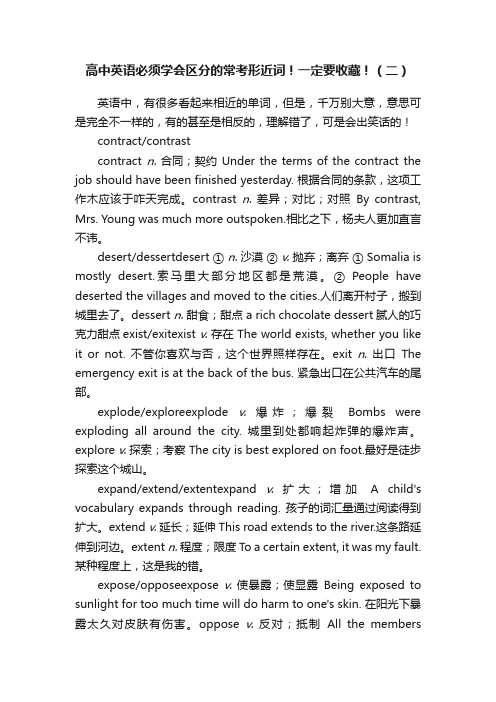
高中英语必须学会区分的常考形近词!一定要收藏!(二)英语中,有很多看起来相近的单词,但是,千万别大意,意思可是完全不一样的,有的甚至是相反的,理解错了,可是会出笑话的!contract/contrastcontract n.合同;契约 Under the terms of the contract the job should have been finished yesterday. 根据合同的条款,这项工作木应该于咋天完成。
contrast n. 差异;对比;对照By contrast, Mrs. Young was much more outspoken.相比之下,杨夫人更加直言不讳。
desert/dessertdesert ① n. 沙漠② v. 抛弃;离弃① Somalia is mostly desert.索马里大部分地区都是荒漠。
② People have deserted the villages and moved to the cities.人们离开村子,搬到城里去了。
dessert n. 甜食;甜点 a rich chocolate dessert腻人的巧克力甜点exist/exitexist v. 存在 The world exists, whether you like it or not. 不管你喜欢与否,这个世界照样存在。
exit n. 出口The emergency exit is at the back of the bus. 紧急出口在公共汽车的尾部。
explode/exploreexplode v. 爆炸;爆裂Bombs were exploding all around the city. 城里到处都响起炸弹的爆炸声。
explore v. 探索;考察 The city is best explored on foot.最好是徒步探索这个城山。
expand/extend/extentexpand v. 扩大;增加 A child's vocabulary expands through reading. 孩子的词汇量通过阅读得到扩大。
高考英语近义动词名词形容词形近词辨析小结
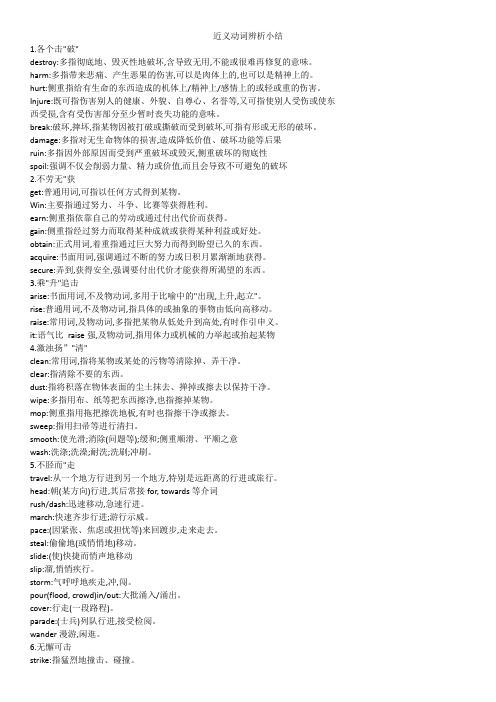
近义动词辨析小结1.各个击"破"destroy:多指彻底地、毁灭性地破坏,含导致无用,不能或很难再修复的意味。
harm:多指带来悲痛、产生恶果的伤害,可以是肉体上的,也可以是精神上的。
hurt:侧重指给有生命的东西造成的机体上/精神上/感情上的或轻或重的伤害。
Injure:既可指伤害别人的健康、外貌、自尊心、名誉等,又可指使别人受伤或使东西受损,含有受伤害部分至少暂时丧失功能的意味。
break:破坏,摔坏,指某物因被打破或撕破而受到破坏,可指有形或无形的破坏。
damage:多指对无生命物体的损害,造成降低价值、破坏功能等后果ruin:多指因外部原因而受到严重破坏或毁灭,侧重破坏的彻底性spoil:强调不仅会削弱力量、精力或价值,而且会导致不可避免的破坏2.不劳无"获get:普通用词,可指以任何方式得到某物。
Win:主要指通过努力、斗争、比赛等获得胜利。
earn:侧重指依靠自己的劳动或通过付出代价而获得。
gain:侧重指经过努力而取得某种成就或获得某种利益或好处。
obtain:正式用词,着重指通过巨大努力而得到盼望已久的东西。
acquire:书面用词,强调通过不断的努力或日积月累渐渐地获得。
secure:弄到,获得安全,强调要付出代价才能获得所渴望的东西。
3.乘"升"追击arise:书面用词,不及物动词,多用于比喻中的"出现,上升,起立"。
rise:普通用词,不及物动词,指具体的或抽象的事物由低向高移动。
raise:常用词,及物动词,多指把某物从低处升到高处,有时作引申义。
it:语气比raise强,及物动词,指用体力或机械的力举起或抬起某物4.激浊扬”"清"clean:常用词,指将某物或某处的污物等清除掉、弄干净。
clear:指清除不要的东西。
dust:指将积落在物体表面的尘土抹去、掸掉或擦去以保持干净。
wipe:多指用布、纸等把东西擦净,也指擦掉某物。
- 1、下载文档前请自行甄别文档内容的完整性,平台不提供额外的编辑、内容补充、找答案等附加服务。
- 2、"仅部分预览"的文档,不可在线预览部分如存在完整性等问题,可反馈申请退款(可完整预览的文档不适用该条件!)。
- 3、如文档侵犯您的权益,请联系客服反馈,我们会尽快为您处理(人工客服工作时间:9:00-18:30)。
高考英语-易混淆形近词单词辨析Advice/Advise Advice是不可数名词: Judy gave mark good advice. Advise 是副词: Jack advised Ben to avoid the questionable chicken salad. Affect/Effect Affect 普遍用作动词: Judy’s humming affected Mark’s ability to concentrate. Effect 常用作名词: Ben was sorry for the effect his humming had.其区别类似于“alter”or “result”即改变和结果。
Among/Amongst Among常见于美式英语. Amongst 常见于英式英语. Among/Between Among 用于表面几个对象之间松散的关系: Judy found a letter hidden among the papers on the desk. Between 用于表明一个对象与另外一个对象,或者几个对象之间的关系: Judy spent all day carrying messages between Mark and the other classmates.Assure/Ensure/Insure Assure 用于表示某事必然发生,或者真实性: Judy assured Ben that no one would cheat at Bingo. Ensure 值保证: Judy took steps to ensure that no one cheated at Bingo. Insure 指保险: Mark was glad the Bingo hall was insured against damage caused by rowdy Bingo players.Breath/Breathe Breath 名词指进出肺部的空气:Judy held his breath while Ben skateboarded down the stairs. Breathe 是动词呼吸: After Mark’s spectacular landing, Ben had to remind himself to breathe again.Capital/Capitol Capital 指大写字母,省会,资金: Judy visited Brasίlia, the capital of Brazil. Capitol 立法大楼,议会大楼: Judy visited the cafe in the basement of the capitol after watching a bill become a law. Complement/Compliment Complement 补充,补足,用来指搭配出现: Judy’s lime green boots were a perfect complement to his jacket. Compliment 奉承: Judy received many compliments on her purple fedora.Disinterested/Uninterested Disinterested 指无私: A panel of disinterested judges who had never met the contestants before judged the singing contest. Uninterested 指不感兴趣,讨厌: Judy was uninterested in attending Ben’s singing class.Defence/Defense Defense 美式英语. Defence 英式英语.Emigrate/Immigrate Emigrate 指离开某地: Ben’s grandfather emigrated from Canada sixty years ago. Immigrate 搬去某地: Mark’s sister immigrated to Ireland in 2004.E.g./I.e.同为拉丁语缩写, e.g.表示“for example,”而i.e. 指“that is.”Empathy/Sympathy Empathy 同感,共鸣。
Sympathy 同情别人悲惨的经历.Farther/Further Farther指空间距离: Judy can run farther than Ben. Further 指抽象关系: Judy is further away from finishing his project than Ben is.Flaunt/Flout Flaunt 指炫耀: Chester flaunted his stylish new outfit. Flout 指鄙视,瞧不起: Posey flouted the business-casual dress code by wearing a tiara and flip-flops.Gaff/Gaffe Gaff is 鱼叉: Judy completed his sailor costume with a gaff borrowed from his uncle’s fishing boat.Gaffe 失态: Mark made a gaffe when she accidentally called Mark by the wrong name.Gray/Grey Gray 美式英语. Grey 英式英语.Historic/Historical Historic 著名的,影响深远的: Judy visited the beach in Kitty Hawk where the Wright brothers made their historic first airplane flight. Historical 符合历史事实的: Posey donned a historical bonnet for the renaissance fair.Imply/Infer Imply指不言明,不明说: Judy implied that Mark was in trouble, but he wouldn’t tell her why. Infer根据情况推断: Judy inferred that Judy was nervous about something from the way he kept looking over his shoulder.It’s/Its It’s “it is”的缩写: Judy needs to pack for her trip because it’s only two days away. Its 所有格: Chester is obsessed with both the book and its author.Lay/Lie Lay 放置: Posey will lay out her outfit before she goes to bed.Lie 躺下: Chester will lie down for a nap. Lay 过去式是laid: Judy laid out her outfit. Lie 过去式lay: Mark lay down for a nap over an hour ago.Lead/Led Lead名词,铅: Judy wore a lead apron while the dentist X-rayed her teeth. Led动词带领领导lead的过去式: Judy led the way.Learned/Learnt Learned美式英语. Learnt 英式英语.Loose/Lose Loose 形容词,松散: Judy discovered that the cows were loose. Lose 动词,失去,失败,输: Judy was careful not to lose his ticket. Principal/Principle Principal 名词,形容词。
名词指学校或者组织负责人: Judy was called into the principal’s office. 形容词,指非常重要: The principal reason for this meeting is to brainstorm ideas for the theme of Judy’s birthday party. Principle 名词,指纪律,规矩: Judy doesn’t like surprise parties as a matter of principle.Inquiry/Enquiry Inquiry 美式英语. Enquiry 英式英语.Stationary/Stationery Stationary 指静止的状态: The revolving door remained stationary because Judy was pushing on it the wrong way. Stationery高级信纸: Judy printed his résuméon her best stationery. Than/Then Than用于比较: Judy runs faster than Chester. Then 用来描述时间顺序: Ben took off running, and then Mark came along and finished her breakfast.Their/There/They’re Their “they”的所有格: Judy and Mark took their time. There 地点: It took them an hour to get there. They’re 是“they are”的缩写: Are Jack and Mark coming? They’re almost here.To/Too To介词表方向:Judy walked to school. She said hello to Mark when she saw him. To 不定式: Judy waited until the last minute to do her homework. Too 也,意思与“also”相似: Judy waited too long to do her homework, too.Toward/Towards Toward 美式英语. Towards 英式英语.Who’s/Whose Who’s who is”的缩写: Who’s calling Chester at this hour? Whose所有格: Judy, whose phone hadn’t stopped ringing all morning, barely ate anything for breakfast.。
